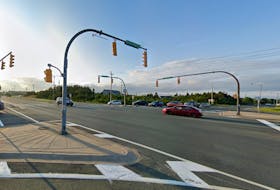An associate professor of economics at York University in Toronto presented a report to the Public Utilities Board (PUB) insurance review hearings Thursday in St. John’s that suggests drivers in this province have been charged too much for insurance premiums since 2011.
Fred Lazar said that despite statements from the Insurance Bureau of Canada (IBC), and the PUB’s own hired actuary consultant, that suggest insurance companies have been losing money in Newfoundland and Labrador, the analysis of data in his report indicates the opposite.
In fact, the report prepared by Lazar and colleague Eli Prisman puts the amount of overpaid premiums for the years 2011 to 2016 between $54 million and $92 million.
“Now, with regards to the loss estimates, and that’s probably what you’re getting to, let me make this clear,” Lazar said in response to a series of questions from IBC lawyer Kevin Stamp.
“Was there overpayment in every year (2011 to 2016) of premiums? The answer to that is unequivocally ‘yes,’ regardless of the actual performance of the insurance companies. Now, how can I say this with certainty? Because the assumptions that were used in setting the premiums used a return on equity that was too high, used a return on investment that was too low, and did not look at best practices with regard to expenses.”
Lazar and Prisman prepared the report on behalf of the Campaign for Accident Victims, which is made up of law firms and lawyers who represent victims of automobile accidents in Newfoundland and Labrador. The campaign is among a number of groups with standing at the PUB hearings that are part of the board’s review of automobile insurance in the province as ordered by the provincial government.
The IBC, the national trade association that represents 90 per cent of Canada's property and casualty insurers, has stated insurance companies in the province are losing money — mainly due to the high cost of settling bodily injury claims — and has proposed changes that include the imposition of a $5,000 compensation cap, plus other reforms that will give accident victims faster access to health care. The IBC also suggests insurance premiums would stabilize over time.
The campaign lawyers argue, however, that accident victims will suffer if a compensation cap is imposed, as they will lose their right to sue for fair compensation. They also argue insurance premiums have not stabilized or decreased in other provinces where a cap has been imposed.
Actuary consultant company Oliver Wyman was asked by the PUB to prepare a number of reports for the insurance review. Previously at the hearings, lawyers questioned Oliver Wyman principal Paula Elliott on the contents of the reports, including how the data was collected, and the assumptions and conclusions arrived at in the reports.
Oliver Wyman concluded that even though higher costs have led to higher premiums and limited availability, insurers still need to charge another 17 per cent on top of 2017 premiums just to be viable.
Lazar and Prisman challenged the Oliver Wynman reports, saying they likely underestimated the profitability of automobile insurance companies in the province and overestimated their premium deficiencies.
“Given the assumptions they made, that would sort of bias their premium as they estimated a premium, underpayments … bias results in that direction,” Lazar said.
“Insurance companies are suggesting that private passenger automobile (insurance) is not a profitable venture in Newfoundland and Labrador. Are they likely correct about that? Well, again from an economic theory point of view, if an activity is not profitable and it’s consistently not profitable, you exit that line of business. You do not stay in it unless it’s a loss leader to generate business in other financial or insurance services in that particular jurisdiction. So, it’s one or the other.
“The argument is that auto insurance in Newfoundland and Labrador is not profitable. If that were the case, then you look at the committed equity to this industry, the capital. If that argument is correct, you would expect the equity allocated to this business to have declined over time. The data show otherwise. So that tends to dismiss that argument.”








